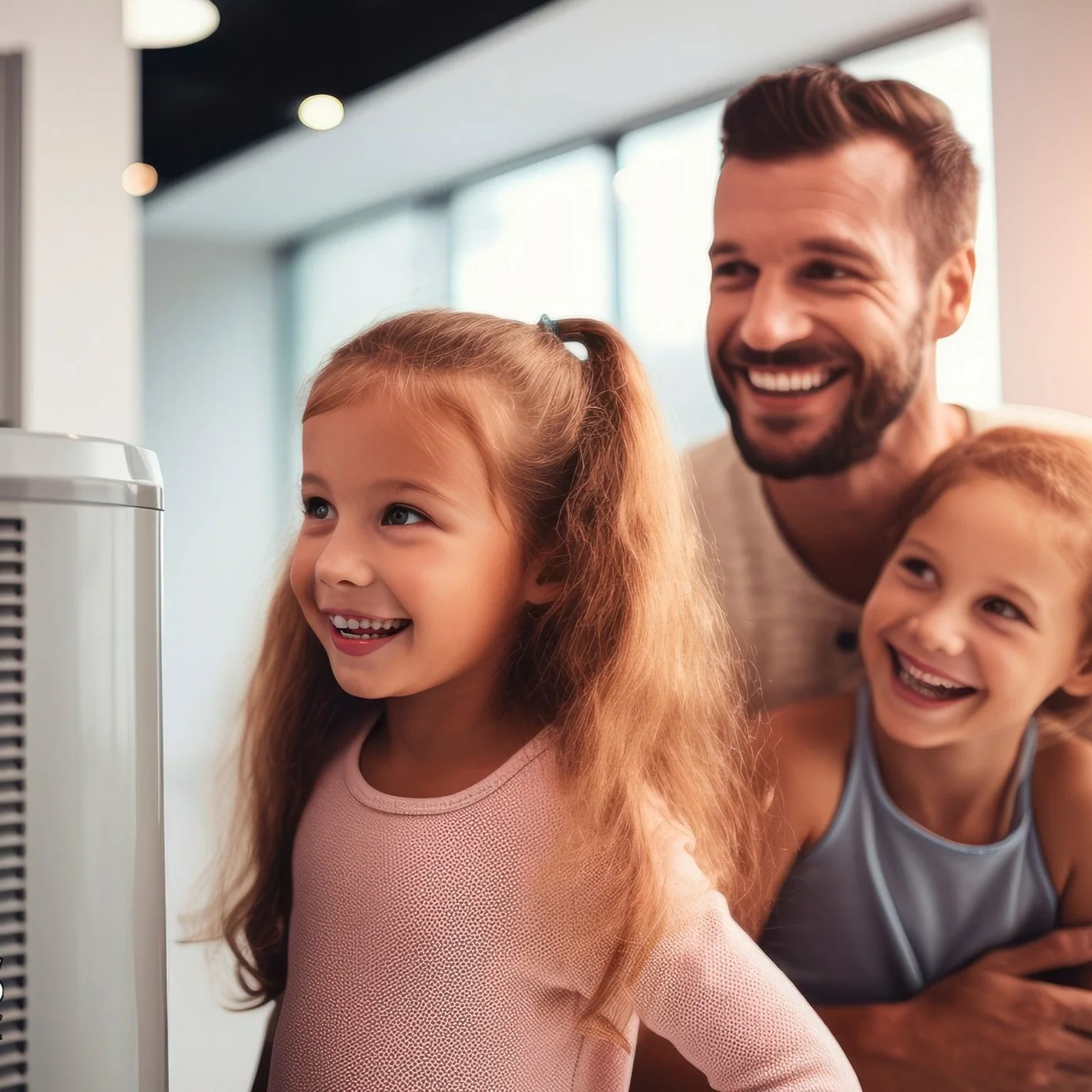
FAQ
YOU HAVE QUESTIONS
WE HAVE ANSWERS

This is a list of some of our most frequently asked questions (FAQ). If you are unable to find an answer to your HVAC-related question here; please feel free to call us directly. Our staff is available to address any questions or concerns you may have Monday through Friday from 9:00 a.m. to 5:00 p.m.
-
Preferably auto. That way, the fan operates only when the temperature requires it. This is the most used and the most efficient setting. However, there are advantages to using the “on” setting. Air is constantly filtered through the unit’s air filter; the constantly circulating air results in an even temperature throughout the house
Check out our video: Save Money: The Ideal Thermostat Setting for Energy Efficiency
-
You may wish to consider replacing your air conditioning or heating system if it is old, inefficient or in need of repairs. Today’s systems are as much as 60% more efficient than those systems manufactured as little as ten years ago. In addition, if not properly maintained, wear and tear on a system can reduce the actual or realized efficiency of the system.
If you are concerned about utility bills or are faced with an expensive repair, you may want to consider replacing your system rather than enduring another costly season or paying to replace an expensive component. The utility cost savings of a new unit may provide an attractive return on your investment. If you plan on financing the purchase, the monthly savings on your utility bill should be considered when determining the actual monthly cost of replacing a system. The offsetting savings may permit you to purchase a more efficient system.
To learn more check out our video: Repair or Replace Your HVAC? 5 Tips to Help You Make The Right Choice
-
Many factors affect the cost of a heating or air conditioning system, including the size of your home, the type and condition of the ductwork installed, and accessories you might need such as a thermostat or an electronic air cleaner. We have a complete range of systems and accessories available to meet all your needs, including your financial ones! We are happy to assist you in finding the right system to meet not only your comfort needs but also your household budget.
-
First, make sure the unit is properly sized. We will provide a load calculation for your home. Also, ask our technician to provide an energy analysis to determine operating cost. Next, consider any comfort issues in the home. Some products can reduce air stratification and uneven temperatures from room to room. If you have allergies, an indoor unit with an ECM motor will allow you to circulate the air in your home continuously while filtering the air for about the same cost as operating a standard light bulb. Finally, know your budget parameters and the efficiency of the system being proposed. Does the system offer a payback? In other words, will the monthly savings over time offset the cost of the new unit or efficiency option being considered.
-
Aside from the placement of the new equipment; our technician will inspect several items making a determination of whether or not these items need to be supplied or replaced. Some of these items include:
Ductwork
Insulation
Refrigerant piping
Electrical service
Wiring, thermostat
Condensate piping
Flue piping
Flue terminations
Chimney liner
Slabs
Filter
Driers
Registers
Grills
Drain pans
Evaporator coil
-
If a system is being added to the home for the first time, most of the items noted in the previous question and answer may be required to install the new system. Besides the equipment, the most significant component is ductwork. Ductwork is usually made of either metal or fiberglass and needs to be properly sized to deliver the right amount of air to each room. This includes supply and return ductwork. The supply duct is attached to the outlet of the furnace or air handler. It delivers air to individual zones within your home.
-
If you have a qualified technician perform the regular preventative maintenance and service suggested for your unit, industry averages suggest that an air conditioner should last 12-15 years and a gas furnace as many as 20-25 years.
-
With the proper attention, heating and cooling systems can keep you comfortable year-round. Heat pumps and oil-fired furnaces and boilers need a yearly professional tune-up. Gas-fired equipment, on the other hand, burns cleaner and can be serviced every other year. A close inspection will uncover leaks, soot, rust, rot, corroded electrical contacts and frayed wires. In furnace (forced-air) and boiler (hot-water) systems, the inspection should also cover the chimney, ductwork or pipes, dampers or valves, blower or pump, registers or radiators, the fuel line and the gas meter or oil tank — as well as every part of the furnace or boiler itself.
Next, the system should be run through a full heating cycle to ensure that it has plenty of combustion air and chimney draft. Finally, cleaning the burner and heat exchanger to remove soot and other gunk will prevent such buildup from impeding smooth operation. For the burner, efficiency hinges on adjusting the flame to the right size and color, adjusting the flow of gas or changing the fuel filter in an oil-fired system. A check of the heat pump should include an inspection of the compressor, fan, indoor and outdoor coils and refrigerant lines. Indoor and outdoor coils should be cleaned, and the refrigerant pressure should be checked.
Check out our video: HVAC Tune-Ups - Are They Really Worth It?
-
Cleaning your air ducts may be beneficial in improving your indoor air quality. A premium whole house duct cleaning will help decrease the spread of contaminants in your home. If your home was recently built cleaning the ductwork can get rid of drywall dust, sawdust and other debris from the construction process.
-
As we heat our homes, the air has a tendency to dry out. This dry air can damage the woodwork and furniture you have in your home as well as zap the moisture from our skin. Dry air even makes you feel cooler because your body senses heat as a combination of temperature and humidity.
Adding humidity to offset this drying process will improve your comfort as well as preserve the woodwork in your home. As an added benefit, you may actually be able to lower your thermostat a couple of degrees. You will not only feel warmer but you may actually lower your heating bill.
Check out our video: Are You Using the Wrong HVAC Filter? Here’s What You Need to Know!
-
One of the reasons to have bi-annual maintenance inspections (Spring & Fall) for your heating and cooling system is to ensure that it is performing at maximum efficiency, which directly affects your monthly utility bills. You also want to make sure your equipment is functioning correctly and catch any problems before they become major expenses.
Regular maintenance will pay for itself in lower repair costs. Lastly, you want to make sure that your heating and cooling system is functioning properly to avoid any problems that could lead to danger to your home or family, i.e. loose electrical connections or holes in your system’s heat exchanger that could leak carbon monoxide.
-
It’s a fact: the trapped air we breathe in our homes can be loaded with dust, pollen, plant spores, and other pollutant particles. In many cases, it’s worse than the air outside. A clogged or poor air filter can also cause major issues and repairs to your HVAC system.
-
No, more than likely, it’s either low on refrigerant or low on airflow. As a homeowner, replace your filter and allow the unit to thaw out. If that doesn’t fix the problem keep the system off and call a professional for service. We recommend having annual maintenance performed to keep your systems in peak operating conditions.
-
The only way to size a furnace or air conditioner for your home is to do a heat load calculation. The capacity needed is based upon how quickly your home gains or loses heat, not by square footage alone.
-
SEER stands for “Seasonal Energy Efficiency Ratio”. Basically it tells you how efficiently it converts electricity to cooling comfort. The higher the SEER rating, the more efficient the system. By federal law all units must be a 10 SEER or higher.
-
AFUE stands for “Annual Fuel Utilization Efficiency”. This rating tells you how much of your heating dollars are converted to heat energy put into your home and how much is lost up the flue pipe. Most older furnaces are 50% to 60% efficient. That means that for every dollar you spend for gas from your utility company, $.40 to $.50 cents are being sent up the flue pipe to the outdoors. Federal law mandates that all furnaces being produced today be at least 80% efficient.
There are several different sizes of furnaces up to 96% efficient. Which means that for every dollar you spend on gas from the utility company $.96 is converted to heat your home and only $.04 is sent out the flue pipe.
-
Yes!! Even though your system is new, it still needs to have annual maintenance performed. This will help keep the warranty in effect. Most all equipment manufacturers state in the terms of their warranty that annual maintenance must be performed by a qualified technician. Keeping your system maintained will give you assurance that it is operating at peak efficiency and safety also keep your new system running like new and prevent major problems before they occur.
-
We spend 90% of our time every day indoors. Plus, today’s efficient, airtight homes are excellent at conserving energy, but that also makes them better at trapping potentially irritating particles inside the home. With the rising number of people who suffer from allergies and asthma, indoor air quality has become more and more important to our general health and well-being.
-
A split system uses indoor and outdoor components to provide a complete home comfort system. A package unit or self-contained unit requires no external coils, air handlers, or heating units.
-
Yes, but you should allow for room for air circulation in and out of the unit, roughly about 18 inches from the unit. Without this room for air circulation, the unit could overheat.
-
Yes, because of efficiency. Air conditioning and heating units are designed to operate as a matched system. The efficiency rating is based on the entire system. Replacing the entire system ensures the system will be reliable and efficient.
-
This depends on your system. If you have a heat pump system then no the system should never be covered as it runs year-round. If you have a straight air condition only then it is your preference. The outdoor units are made and designed to withstand the elements of the outdoors however a cover may help to keep the system clean. I like to compare this to a car cover even though your car can handle the outdoor elements a cover helps to keep the cosmetics strong.
Check out our video: Should You Cover Your AC in The Winter? Here’s What You Need to Know
-
Of course! Our friendly and knowledgeable customer services reps at Air Dynamics are available to answer your questions 24/7/365.
Air Dynamics HVAC
We Service
Abington, Bensalem, Cheltenham, Churchville, Croydon, Elkins Park, Glenside, Holland, Horsham, Huntingdon Valley, Jenkintown, Langhorne, New Hope, Newtown, Philadelphia, Richboro, Southampton, Washington Crossing, Willow Grove, Yardley, and more
Counties Serviced Include:
Bucks, Burlington, Camden, Mercer, Montgomery & Philadelphia












